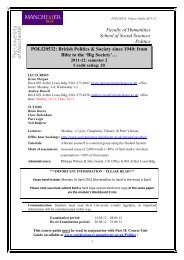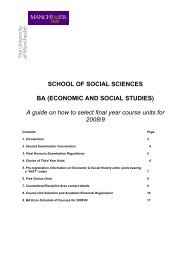CHNN 22, Spring 2008 - School of Social Sciences
CHNN 22, Spring 2008 - School of Social Sciences
CHNN 22, Spring 2008 - School of Social Sciences
You also want an ePaper? Increase the reach of your titles
YUMPU automatically turns print PDFs into web optimized ePapers that Google loves.
epudiated, and you apologise to Tito for things which you call slanders, it inevitably meant that<br />
the trials themselves were false. This then immediately led on to another question. If these trials<br />
were false and they had a great deal in common in the whole nature <strong>of</strong> them with the Moscow<br />
trials, what about the Moscow trials? I was raising this right from June 1955 following the<br />
Khrushchev-Bulganin visit to Yugoslavia; raising it with colleagues in the YCL, the YCL leadership,<br />
more or less anybody, Klugmann and all these people. I got no satisfactory reply <strong>of</strong> course. We had<br />
to fight right through to get the communist party <strong>of</strong>ficially to repudiate the Moscow trials. I fought<br />
for years and years and years, and it wasn’t until 1988, I think, that we actually repudiated the<br />
trials and the support for the Moscow trials.<br />
I hadn’t just accepted the East European trials for their own sake, but I was influenced by what<br />
appeared to me to be relatively plausible indictments; the Rajk thing, how he had been a young<br />
communist activist who was then arrested in the thirties, and he was recruited when he was<br />
arrested and so on – it appeared to be plausible. One’s initial inclination was to try to find a<br />
plausibility in these trials, because the implication, politically, if one found no plausibility in them,<br />
was that you had to then call into question the whole <strong>of</strong> the nature <strong>of</strong> the regimes that shoot their<br />
leaders on framed-up charges. There was a correspondence I remember in the New Statesman<br />
regarding this, in which Dutt and various other people took part. But in general it seemed to me<br />
that things were progressing in these countries from what I understood. Obviously I looked at<br />
things greatly through much too rose-coloured spectacles, because one wanted to see these things<br />
succeed. I’d visited the GDR in 1951, when I worked for three months in Berlin in preparation for<br />
the world youth festival. Before that I was a month in Czechoslovakia at the end <strong>of</strong> 1950, because<br />
Valerie, my wife, was in a sanatorium, and with Pollitt’s help I got a visa to go and stay out there for<br />
a month. I went down the mines with a student brigade; it seemed to be positive. I don’t know<br />
Czech, so it was limited what I could get out <strong>of</strong> it, but as far as Germany was concerned I did know<br />
the language and it was a period <strong>of</strong> positive feelings and objectives and reconstruction and so on.<br />
So I did accept the trials at the time, and even wrote in Challenge justifying the Slansky trial.<br />
Darkness at Noon, which I’d read, was an extremely fascinating psychological study, but it was not<br />
concerned with the factual basis <strong>of</strong> the trials. It was possible to read Darkness at Noon as an<br />
extremely clever psychological study without seeing anything in it, because there wasn’t anything<br />
in it, that could call into question the factual basis <strong>of</strong> the trials.<br />
T<br />
he secret speech was pretty shocking even though it wasn’t entirely out <strong>of</strong> the blue. I found<br />
that the Yugoslav apology raised questions about the Moscow trials, though it didn’t<br />
answer those questions. Khrushchev’s speech answered a lot <strong>of</strong> questions in an extremely<br />
negative way. I regarded these as absolutely shattering revelations, that it was necessary to make a<br />
much deeper analysis <strong>of</strong> our whole attitude to the Soviet Union. This is what I argued in the YCL<br />
leadership and you will see reports <strong>of</strong> discussions in the YCL on this question. John Moss and<br />
Gerry Cohen, the national secretary and the national organiser, basically followed the party line,<br />
which was to try to minimise everything. There is no doubt that there was an attempt to play down<br />
the gravity <strong>of</strong> the revelations and to say, you know, ‘The Russians have now revealed it all, they’ve<br />
shown great courage, and this means that everything’s going to be alright in the future.’ Another<br />
thing I was very critical <strong>of</strong> was the argument that it was all a question <strong>of</strong> the cult <strong>of</strong> personality, and<br />
we haven’t got the cult any more – which they hadn’t <strong>of</strong> course – therefore, nothing to worry about;<br />
which <strong>of</strong> course is nonsense. From thereon in we had the most virulent battles in the YCL<br />
leadership; not only the EC sub-committee but the EC itself, and the national committee. These<br />
struggles went on right through ’56, ’57, right up to the last one which I was involved in, which was<br />
the summer <strong>of</strong> 1958 with the execution <strong>of</strong> Imre Nagy. As far as I was concerned, this was just a<br />
continuation <strong>of</strong> the old stalinist practice <strong>of</strong> killing those political leaders who you disagreed with or<br />
wanted to get out <strong>of</strong> the way. But this was defended by people, not only John Moss, but also Jimmy<br />
Reid who’d been brought down as national organiser – which he doesn’t like being reminded <strong>of</strong>. I<br />
was the main person, I suppose – not by any means the only person – arguing for a much more<br />
critical examination <strong>of</strong> the situation in the Soviet Union and Eastern European countries. After the<br />
1956 YCL congress, I was nominated for the national secretaryship <strong>of</strong> the YCL against John Moss.<br />
There was a big battle in which John Moss was re-elected, I think by seventeen votes to ten, after<br />
the party came in through George Matthews, who attended the meeting in order to argue that they<br />
should put John Moss back as the national secretary. At a meeting <strong>of</strong> the YCL executive committee<br />
about that time, Johnny Gollan said, ‘We’re stronger than you, and if you don’t comply we’ll get rid<br />
<strong>of</strong> you and we’ll start another YCL.’<br />
29
















